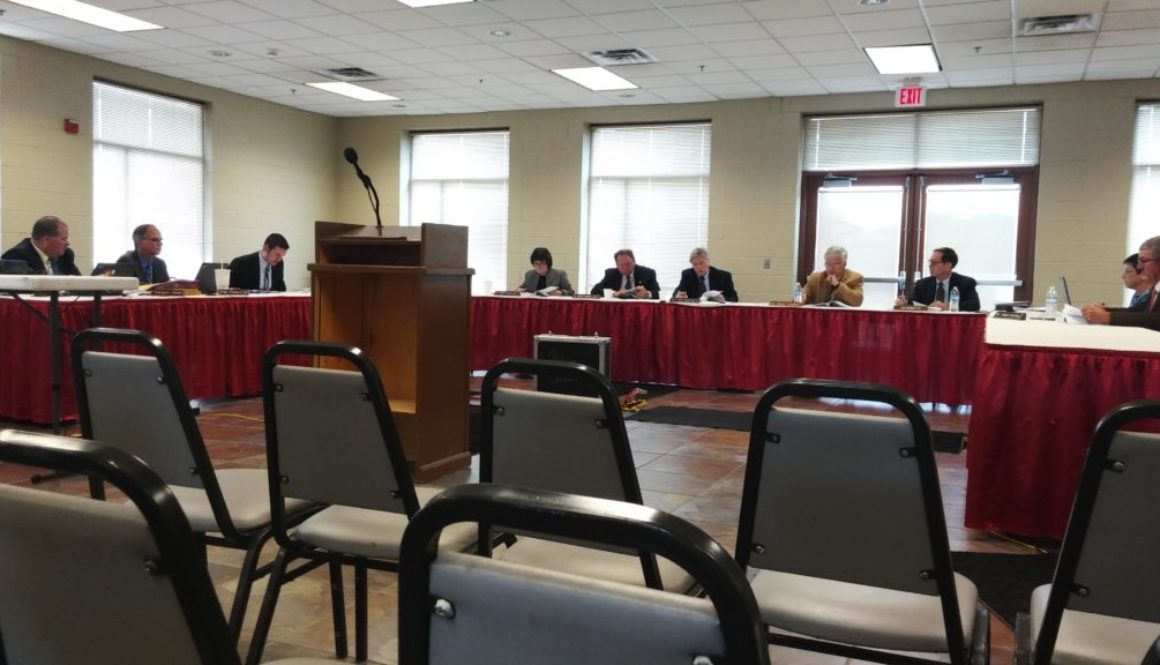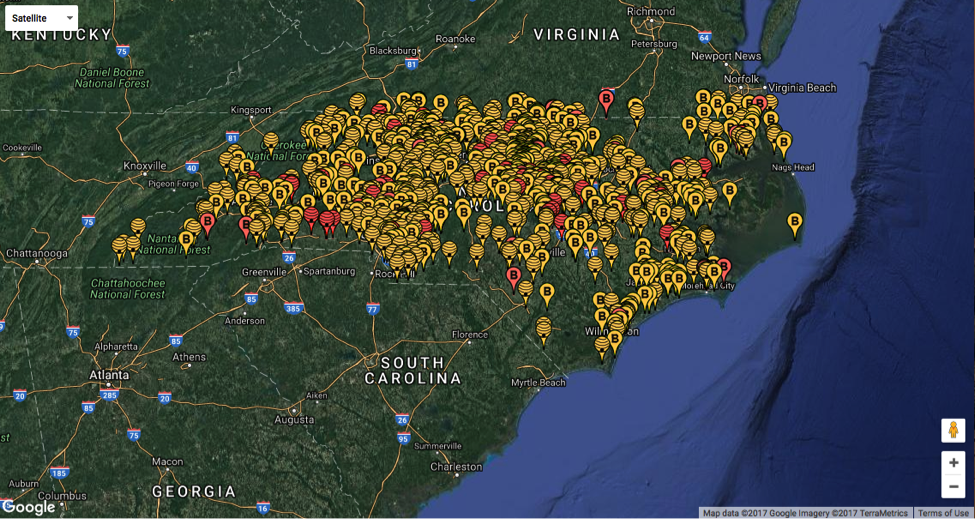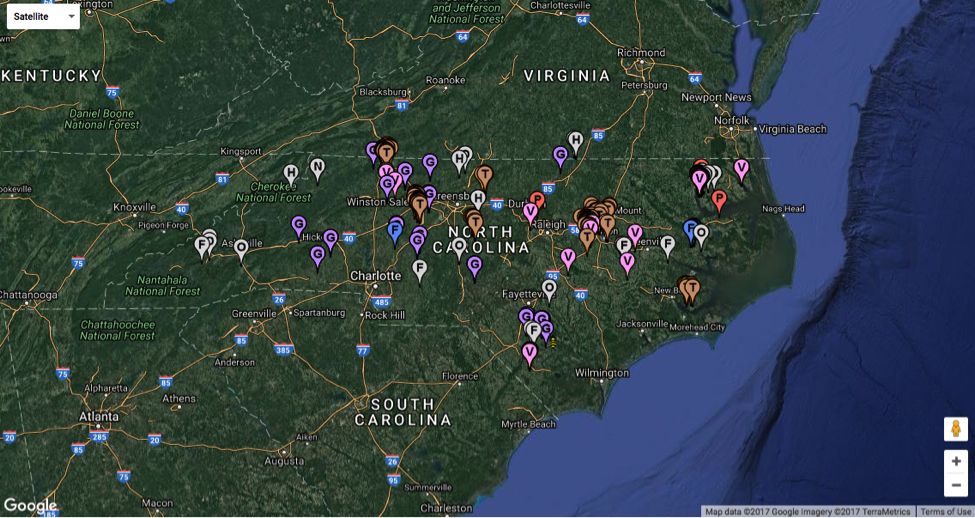
Notes by Patricia Patterson, Policy Advocacy Intern, Toxic Free NC
In attendance: Dr. Rick Langley (Chairman); Dr. Allen Scarborough (Vice Chairman); Dr. Colleen Hudak-Wise; Dr. Benson Kirkman; Mr. Don Rogers; Mr. Shawn Harding; Mr. Pat Jones (Substitute for the Secretary)
Not in attendance: Mr. Jim Burnette (Secretary)
Consider Board Minutes from March 14, 2017
Dr. Hudak-Wise moved that the minutes be approved as is, which was seconded by Mr. Rogers. This was unanimously approved.
Presentation by Dr. Gary Roberson (NCSU) titled, “Agricultural Use of Unmanned Aerial Vehicle (Drone) Technology”
Dr. Roberson, an associate professor in the Department of Biological and Agricultural Engineering at NC State University, presented on the various applications of unmanned aerial vehicle (UAV) technology for commercial use. In UAV technology, sensing is used to monitor satellite imagery and other data in order to improve the agricultural landscape. Electronic sensors can track temperatures, decipher relative heat indexes, and gather soil properties. Dr. Roberson discussed several guidelines set by the US Federal Aviation Administration (FAA) for operating UAV technology at the commercial level, including the minimum age to obtain a license and where to access information on testing (see https://www.faa.gov/). Since this is an emerging technology, Dr. Roberson stressed the importance of educating the public on the requirements for a commercial license and application information.
The current options for UAVs are fixed wing, rotary wing, and hybrids. Fixed wing UAVs are smaller, electric-powered drones that possess the capacity for multiple sensors such as RGB, thermal, and hydro spectral cameras that can be used for gathering a wide range of data; this technology is an especially significant advancement in the surveillance and surveying world. Rotary wing is the most common among UAV users due to its various sensor controls and its vertical take off and landing, which requires less space and planning.
Dr. Roberson elaborated on the use of UAV technology to collect heat signatures of livestock and to track crop and plant health. In addition to this, Dr. Roberson mentioned the possibility of using UAV technology to monitor water quality at the state level in the future. UAV technology is helpful in identifying regions where crops have been negatively affected by natural phenomena such as disease, erosion, and microburst wind damage. Dr. Roberson concluded that UAV technology could assist farmers and crop scouts in discovering problems with crop growth in a timely manner to promote recovery.
Proposal for a Part-Time Bilingual (Pesticide) Specialist; Request for Funding
Mr. Pat Jones, the Deputy Director for Pesticide Programs, proposed that the board fund a part-time position for a bilingual specialist within the division. The bilingual specialist will translate and reproduce information on pesticide use (e.g. pest control and disposal) in documents such as exams, brochures, pamphlets, signs, and other outreach materials. The Title 6 Civil Rights Act of 1964 states that employers must provide meaningful access to individuals with limited English proficiency in the workplace. In an effort to reduce the chances of insubordination with Title 6 and to provide opportunities for all workers to access pesticide information, Mr. Jones urged the board to further consider funding the position for the proposed bilingual specialist, Carmina Hanson, a native Spanish speaker, at the requested amount. The proposed hourly rate for the part-time position was $24.50 for 20 hours per week, a yearly salary of $25,084.
Mr. Harding made a motion to accept the proposal, and Dr. Hudak-Wise made a motion to second it. The motion was unanimously accepted.
Proposal for the Production and Distribution of Pesticide Record-Keeping Manuals; Request for Funding
Dr. Wayne Buhler, the interim department head and professor in the Department of Horticultural Science at NC State University, proposed that the board fund the production and distribution of pesticide record-keeping manuals. The manual assists the private grower (primary audience) as well as the commercial applicator (see https://content.ces.ncsu.edu/north-carolina-agricultural-chemicals-manual/pesticide-use-and-safety-information) in regulating their pesticide use as well as providing detailed information on state and federal application restrictions. The manual is a simple way for the grower to monitor their pesticide use and to maintain written records of this information.
The record-keeping branch of the Agricultural Marketing Service and the USDA, no longer in existence, requested a revision of the manual to remove all North Carolina specific information in order for the manual to be used at the federal level. Dr. Buhler requested that the board fund the production and distribution of 15,000 revised manuals through the Pesticide Environmental Trust Fund for $44,400. In addition to the proposed funds from the board, the NC Agro Medicine Institute accepted Dr. Buhler’s proposal for assistance in funding the project.
Dr. Hudack-Wise made a motion to accept the requested amount for funding. Dr. Langley seconded this motion. The motion carried with a unanimous vote.
Proposal for a Design and Construct an Inexpensive Demonstration for Pesticide Storage, Mixing, and Loading Facility for Small Farmers; Request for Funding
Mr. Jerrold Moody, the Avery County Extension Director, proposed that the board assist in funding the design and construction of a facility for pesticide storage, mixing, and loading. Mr. Moody expressed concern regarding unsafe disposal methods in terms of the potential negative environmental and human health impacts. This facility would also serve as a means to promote educational awareness on pesticide disposal and storage. The proposed funding for the new pesticide facility was $15,360.
Dr. Hudack-Wise made a motion to accept the requested amount for funding. Mr. Rogers seconded this motion. The motion carried with a unanimous vote.
Proposal for WPS Respiratory Support; Request for Funding
Mrs. Jessica Wilburn (in substitution for Dr. Robin Marcom), a Nurse Coordinator at the NC Agromedicine Institute, proposed that the board fund supplies such as outreach materials, fit testing materials, and other educational materials to promote WPS respiratory support. According to the Occupational Safety and Health Administration (OSHA) requirements, workers must have a medical evaluation, be fit tested, and undergo respiratory training before operating a respirator and must maintain these record for at least two years. The proposed amount for funding ($30,000) would also cover translation, printing, and distribution services.
Dr. Hudack-Wise made a motion to accept the requested amount for funding. Mr. Rogers seconded this motion. The motion carried with a unanimous vote.
Settlement Agreements



